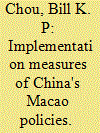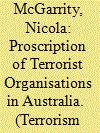| Srl | Item |
| 1 |
ID:
129282


|
|
|
|
|
| Publication |
2012.
|
| Summary/Abstract |
China has become more proactive in Macao affairs in response to the structural roots of corruption, the spillover of the criminal activities connected to Macao's casinos to the Mainland, and the public resentment to the social costs generated by the rapid development of Macao's casino-based economy. Through various implementation measures, Chinese leadership hopes to strengthen the oversight on the government, improve the communication between the government and the public, and groom the talents of all kinds through structural reform, economic development, and education. These implementation measures involve two lines of thought of Chinese leadership: concentration of Macao's political power in the executive branch and strengthening of Beijing's supremacy over Macao.
|
|
|
|
|
|
|
|
|
|
|
|
|
|
|
|
| 2 |
ID:
095032


|
|
|
| 3 |
ID:
114255


|
|
|
|
|
| Publication |
2012.
|
| Summary/Abstract |
This article explores the extent to which Indian domestic debate shapes strategic behavior. It makes the case that domestic politics, and more importantly, the role played by domestic elites-from within the ruling party and the opposition-have historically set limits on the exercise of executive power. Specifically, it maps the relative importance of domestic politics on Indian foreign policy during the Nehru years (1947 to 1964), investigating the tension between elite domestic contestation and India's approach to alliances. In sum, it seeks to recover a part of Indian strategic history that appears to have fallen prey to a dominant historical narrative that is wrapped around the persona, rhetoric, and vision of Prime Minister Jawaharlal Nehru.
|
|
|
|
|
|
|
|
|
|
|
|
|
|
|
|
| 4 |
ID:
159890


|
|
|
|
|
| Summary/Abstract |
Australia has a long history of legislation enabling the proscription of organisations which pose a threat to Australian security. Such laws are by no means a post-9/11 phenomenon. However, the proscription of organisations has assumed a particularly significant place in this country’s legislative response to the threat of terrorism since the terrorist attacks in New York and Washington. The focus of this article is upon the provisions of Division 102 of the Criminal Code Act 1995 (Cth), as it is this regime which has been most commonly relied upon in practice. Whilst the nature of the threat of terrorism faced by Australia has moved through several distinct phases, the basic structure of this regime has remained substantially intact. For that reason, although this article will canvass recent legislative amendments made in response to the foreign terrorist fighters phenomenon specifically, the aim is to provide a holistic picture of the form and substance of the proscription regime in Division 102. This builds upon the pre-existing scholarship in the field by carefully analysing the lessons which can be drawn from the now quite significant number of prosecutions for terrorist organisation offences.
|
|
|
|
|
|
|
|
|
|
|
|
|
|
|
|
| 5 |
ID:
167554


|
|
|
|
|
| Summary/Abstract |
One of the key characteristics of Stalinism was the relationship between its formal and informal aspects. This is reflected clearly in the way in which, over time, the formal institutions of rule were supplanted by more informal mechanisms of decision-making. However, although the formal institutions seemed to atrophy, they were not abolished, but continued to become the basis upon which the post-Stalin leadership rested. The essay explains why one of those institutions, the Politburo, was maintained despite its atrophy as a decision-making organ, explaining this principally as a result of both strategic and tactical considerations.
|
|
|
|
|
|
|
|
|
|
|
|
|
|
|
|